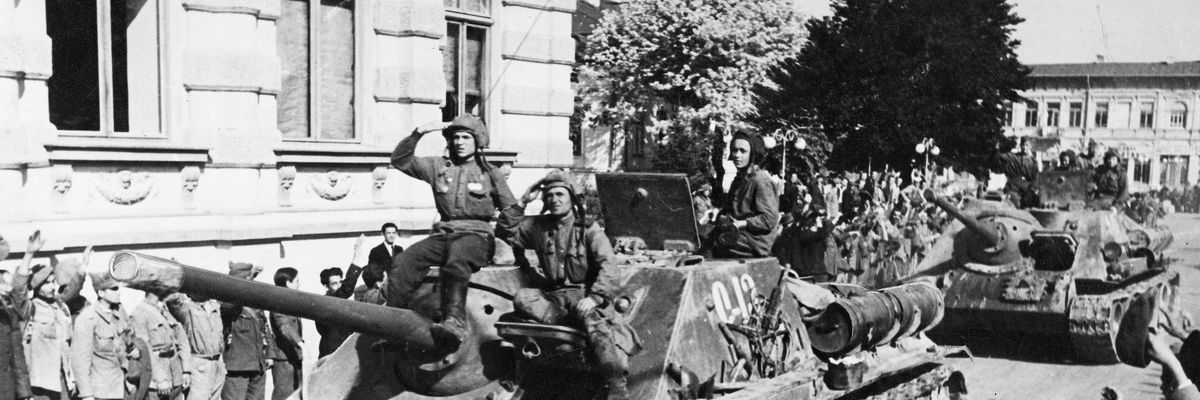Eighty-one years ago, in the early summer of 1941, Nazi Germany launched Operation Barbarossa, attacking the Soviet Union along a massive front at the height of World War II.
Drunk on barely contested victories sweeping eastward through Poland and Czechoslovakia and then westward through France, which seemed to reinforce convictions of Aryan racial superiority, the Nazi war machine rushed toward Moscow, feeding Hitler's hopes to capture the Kremlin by Christmas and rid the world of "the Judaeo-Bolshevik threat" and subordinate or liquidate racially inferior Slavs on the way to replicating--in a radically telescoped way--the U.S. government's "pacification" and re-peopling of the North American continent in the centuries previous.
Nazi occupation--consistent with the regime's exterminist ideology and program--murdered and brutalized staggering numbers of Soviet citizens, on a barely imaginable scale of calculated atrocity. The Soviet Red Army, taken by surprise and in disarray in the face of the scale and speed of the assault, also sustained staggering losses of both personnel and equipment as well as territory.
Within two and a half months, the Wehrmacht was encroaching on Moscow. As the end of 1941 approached, however, Red Army resistance stiffened and repulsed the Germans, dealing them their first defeats of the war. After an intense, nearly six-month pitched battle, the Red Army routed the Wehrmacht at Stalingrad and began to turn the tide of the war. Victory in the massive tank battle at Kursk and liberation of Leningrad from a siege of more than two years that took an incredible toll on the civilian population set the stage for a massive Soviet offensive.
So this date also marks the initiation, seventy-eight years ago, of Operation Bagration, the massive Red Army offensive that swept the Germans out of Soviet territory, drove them back across eastern Europe, and culminated in the final destruction of fascism, as illustrated dramatically when the Soviet flag was raised above the Reichstag building in May of 1945.
There are two takeaways from this history I want to stress. One is a nearly aesthetic appreciation of how the world moves by contradiction. Destruction of Bolshevism internationally and of aggressive working-class opposition domestically was a fundamental objective of the Nazis and other fascist movements and of the elements that financed and cultivated them on both sides of the Atlantic.
For the Nazis in particular destruction of the Soviet Union was pivotal to their twisted racialist politics. And, not unlike on a much smaller scale, at least so far, the MAGA fantasy of "the pedophile Democratic elite" today provides a scapegoat no one might reasonably defend and thus facilitates the misdirection that is always central to a politics of scapegoating, construction of the fantasy of the "Jew/Jew-Bolshevik-Jew banker" and cosmopolite/Jew and Jew/Slav subhuman did the same for Hitler's National Socialism.
Once upper-class German reactionaries helped the Nazis come to power, the exterminism of the Final Solution and an invasion of the Soviet Union were as close to foreordained as actual history can be. And the practical reasons that made the Soviet Union such a threat to both fascists and the capitalist classes they served are precisely what would enable the collective organization that sealed the Germans' fate after their initial months of success in 1941. (This brings to mind the similar irony, also pleasing in a sort of aesthetic way, that antebellum Democrats' great victory in engineering and winning the Mexican War in 1848, which largely reflected concern to expand slavery, became the basis for slavery's destruction less than twenty years later.)
The second takeaway is more prosaic. Not only did the Soviet Union bear the most extreme brunt of the war's horrors; it also was without question the most central force in the Nazis' defeat. That's why, for example, my father--who was in the Normandy invasion and detested the D-Day anniversary in addition to all that "greatest generation" crap--always said that if his generation should get props for something, it should be Social Security and the CIO. He would comment acerbically that if it hadn't been for the Red Army, the war may have had a very different outcome. He also never stopped remarking, practically even on his deathbed, on the hypocrisy that he was sent to fight the racist Nazis in a racially segregated U.S. Army.
Anyway, in the spirit of celebrating holidays, feel free to take a moment to commemorate Operation Bagration and its outcome.




